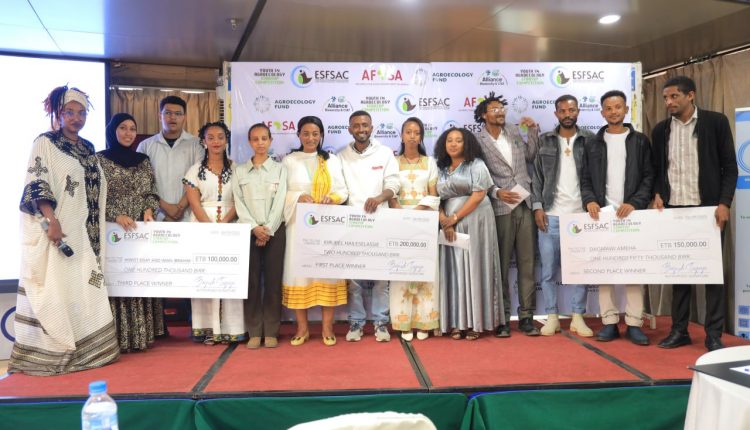Youth in Agroecology Competition Honors Winners, “Homegrown Solutions” in Focus
Addis Ababa, Sept. 6, 2025 (FMC) — The Ethiopian Sustainable Food Systems and Agroecology Consortium (ESFSAC), in partnership with the Alliance for Food Sovereignty in Africa (AFSA) and the Agroecology Fund, recognized young innovators today at the Youth in Agroecology Startup Competition award held in Addis Ababa, highlighting Africa’s capacity to address food system challenges with homegrown solutions.
The event brought together youth entrepreneurs, government representatives, partners, and stakeholders to celebrate and amplify the contributions of Ethiopia’s next generation of food system leaders.
Bayush Tsegaye (PhD), Executive Director of ESFSAC, opened the ceremony, emphasizing the critical role of youth as intergenerational bridges in advancing Ethiopia’s food sovereignty.
She outlined plans to establish a digital agroecology library, which will make accessible critical information and resources on sustainable agricultural practices. She described agroecology as a sector that integrates ecological principles into agriculture, linking innovative farming practices with community-led movements, and underscored the importance of investing in youth as custodians of the country’s food systems future.
Highlighting continental challenges, Bayush noted that biodiversity loss due to monoculture, combined with the increasing influx of ultra-processed foods in African markets, threatens both the local economy and public health. She stressed that food sovereignty is key to achieving long-term food security, emphasizing that what is considered food for a country should not be dictated by external agencies. “External prescriptions have not ended food insecurity or poverty,” she said.
On the way forward, she outlined the consortium’s plans to continue soliciting funding, provide mentoring support to youth in agroecology, conduct follow-up monitoring of startups, engage partner civil society organizations and donors, and broaden the competition’s outreach as resources allow. “The current pilot competition is a drop in the ocean, but with the support of the private sector and other supporters, we can empower more youth over time,” Bayush said.
She concluded that agroecology is a pathway to food security and sovereignty, that youth are dynamic change agents, and that sustainable food systems can be achieved by supporting youth-led agroecological businesses. Bayush also highlighted the need for targeted investments, collaboration, and synergy among stakeholders to empower youth, women, and the wider community through agroecology.
Million Belay, General Coordinator at AFSA, highlighted the broader significance of youth engagement, noting that Africa can solve its own food system challenges through local innovation. He pointed to global problems including food shortages, climate change impacts, the erosion of indigenous food cultures, and the growing prevalence of processed foods that contribute to health risks. Million stressed that empowering young people and encouraging their creativity is vital to achieving sustainable solutions and strengthening food sovereignty across the continent.
Berhanu Adere, Head of Innovation and Entrepreneurship Development at the Ministry of Labor and Skills, said such platforms provide opportunities for young people to develop local solutions and contribute to the national economy. He noted that empowering youth in this way can reduce dependency on imports and conserve foreign exchange.
The winners of the competition received prizes amounting from 100,000 to 200,000 birr. The competition attracted 72 applicants from 11 sub-cities of Addis Ababa, of whom 43 advanced past initial screenings to compete in the final round.
Launched in July 2025, the Youth in Agroecology Startup Competition focused on two themes: agroecological agriculture and the promotion of healthy, sustainable foods. Applicants submitted one-minute videos detailing their startups, and the top 10 finalists received mentorship and training before pitching to a panel of judges in August 2025.
The competition is part of the “My Food is African / My Food is Ethiopian” campaign, which promotes indigenous foods and agroecological innovation across Ethiopia.
Established in May 2023, ESFSAC is a network of civil society organizations committed to transforming Ethiopia’s food systems through sustainable, community-led agroecology. The consortium works to empower youth, strengthen local knowledge, and integrate ecological principles into agricultural practices, with the goal of achieving long-term food security and sovereignty.
Organizers said they plan to expand future competitions beyond Addis Ababa to involve youth from across Ethiopia, aiming to enhance participation, visibility, and resilience in local food systems.
By Sosina Alemayehu

